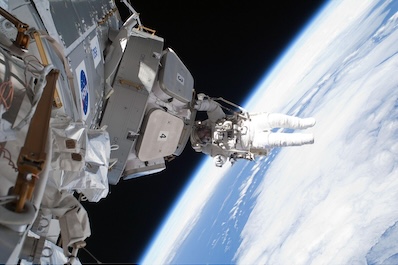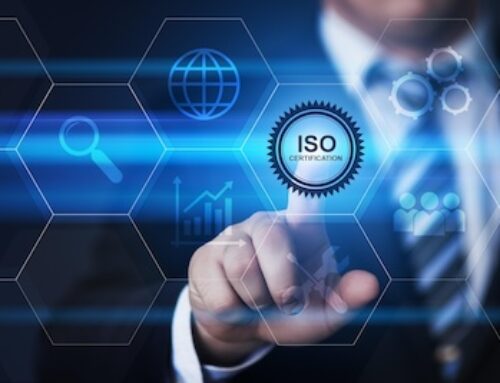In our last blog post we took an in depth look at how ISO 9001, the international standard for quality management systems, helps aerospace and defense companies achieve consistency and compliance.
While ISO 9001 provides a strong foundation for quality, the demands of the highly regulated aerospace and defense industries often require even more rigorous standards. That is where AS9100 comes into play.
In today’s blog we’re going to take a deeper look at the differences between ISO 9001 vs AS9100, to help you determine if your organization requires the additional aerospace quality standards.

ISO 9001 – Aerospace’s Foundation of Quality
We took an in depth look at ISO 9001 in our previous blog post, but for those that missed it, we’ll provide a quick refresh.
ISO 9001 is one of the world’s most commonly adopted international standards. It provides organizations in nearly any industry with a framework for implementing a Quality Management System (QMS).
ISO 9001 is composed of guidelines that help companies do everything from documenting their processes to maintaining a focus on customers to striving for continuous improvement.
In short, ISO 9001 provides a solid foundation for organizations to reduce errors, increase efficiency, and produce high-quality products.
While ISO 9001 provides a robust QMS for a variety of industries, the demands of aerospace industry standards and defense industry compliance often require a greater commitment to quality.
AS9100 Certification – The Next Level of Aerospace Quality Standards
To address the specific quality needs of the aerospace and defense industries, AS9100 was created. First introduced in 1999, AS9100 was developed by the International Aerospace Quality Group (IAQG) as an extension of the foundation laid by ISO 9001. It uses ISO 9001 as a starting point and adds additional safety and quality requirements specific to the aerospace and defense industries.
So what is different with AS9100? Let’s take a look:
A Greater Focus on Product Safety
Aerospace components face a much higher degree of stress than typical parts, and as a result, AS9100 places a greater emphasis on product safety and risk management. For example, AS9100 uses a tool called Failure Mode and Effects Analysis (FMEA) to identify potential fail points and their possible impact. FMEA helps organizations mitigate risk by implementing preventative measures.
Configuration Management
A big part of AS9100 is configuration management, which seeks to track every piece of a product’s configuration. This means every part is documented and controlled, so that any changes are managed and approved before they are implemented. It ensures that everything that comprises the final product fits together, without issue.
Stricter Supply Chain Control
AS9100 also takes steps to prevent counterfeit parts from reaching supply chains, with a focus on traceability and documentation of materials and components used. This includes regular audits of suppliers, as well as keeping extensive records of all the components, materials, and processes used in the production.
How to Know if Your Organization Needs AS9100 Certification
Most manufacturing organizations will only require ISO 9001 certification to satisfy their QMS needs. However, companies that are directly involved in the aerospace and defense industries stand to benefit the most from AS9100 certification.
While it is not mandated, achieving AS9100 certification demonstrates a commitment to safety, reliability, and quality that is essential to doing business in the aerospace and defense industries.
Some types of manufacturers who would benefit from AS9100 certification include:
- Aircraft Manufacturers – Companies that produce commercial or military-grade aviation vehicles, or spacecraft.
- Components Suppliers – Organizations that produce parts, assemblies, and other components for aircraft.
- Defense Contractors – Companies that build products or provide services for the military and defense industries.
- Maintenance, Repair, Overhaul Providers – Companies that provide repair and maintenance services for aircraft or military equipment.
Because of the sensitive nature of these industries, the highest level of quality and safety is required to satisfy clients. Obtaining AS9100 certification is essential to show that your organization is ready to meet extremely high aerospace quality standards and obtain defense industry compliance.
Achieving AS9100 Certification
Achieving AS9100 certification is essential to doing business in the aerospace and defense industries. If your organization already has ISO 9001 certification, then you’ll be well-positioned to upgrade to AS9100. But even if you don’t have ISO 9001 certification, you can still obtain AS9100 certification, since it builds upon the former.
Here is a breakdown of how you can achieve AS9100 compliance:
Understand AS9100 Requirements
Start by gaining an understanding of what the requirements of AS9100 entail, as well as your organization’s current approach to quality management. Purchasing a copy of the current version of the standard (AS9100D) will help with familiarizing your organization.
Conduct a Gap Analysis
A gap analysis is a tool that can be used to compare your current state of quality management to the standards of AS9100. Gap analysis will unveil the differences between the two, identify areas of improvement, and prioritize actions needed to achieve compliance with AS9100.
Plan Implementation
Establishing a dedicated team to close the gaps and achieve the aerospace quality standards of AS9100 is essential. This team will take the lead on designing the new QMS, including defining and documenting your organization’s procedures, processes and policies, as well as training employees on AS9100 principles.
Certification Audit
Before your organization can become AS9100 certified, you will need to receive an audit from an accredited certification body. The audit is conducted in two stages, and will determine if your QMS meets the new standards. Stage 1 includes a complete review of your QMS documentation, while stage 2 includes an onsite evaluation. The certification body will look to verify that your QMS meets or exceeds the AS9100 aerospace quality standards, and will report on any issues they discover, along with corrective action needed. Once all issues are resolved, certification can be awarded.
Continuous Improvement
Achieving AS9100 compliance is important, but maintaining compliance is an ongoing responsibility. Keeping certification requires ongoing monitoring and evaluation of your processes. Your team should always strive for continuous improvement. It is a key aspect of both ISO 9001 and AS9100, and every step should be taken to ensure that your organization continues to strive for quality long after receiving certification.
Conclusion
Achieving AS9100 certification takes a long-term commitment to quality, one that is essential for meeting stringent aerospace quality standards and obtaining defense industry compliance.
Companies that adopt AS9100 can solidify their reputation, and gain a competitive advantage in an industry where even a minor failure can have catastrophic results.
If you are seeking help implementing AS9100 in your organization, contact Manex. We have provided high-quality consulting and training services to Northern California’s manufacturing industry for nearly 30 years, including AS9100 training and compliance.
Don’t put your commitment to quality on hold any longer. Contact Manex today, and let us help you improve your overall manufacturing performance today.


